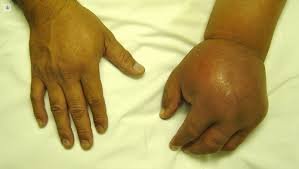Frozen Shoulder, also known as Adhesive Capsulitis, is a condition characterized by pain and stiffness in the shoulder joint, resulting in a significant restriction of both active and passive shoulder movements. The condition occurs due to inflammation and thickening of the joint capsule of the glenohumeral joint, which can lead to the formation of adhesions between the folds of the capsule. Although the exact cause is often unknown, it is commonly associated with prolonged immobility, injury, or underlying medical conditions.

Risk Factors and Associated Conditions:
Frozen Shoulder is frequently aggravated by systemic health issues, including:
- Diabetes Mellitus: Individuals with diabetes are at a higher risk of developing Frozen Shoulder, and the condition tends to be more severe and prolonged.
- Cardiovascular Diseases: Reduced blood flow and systemic inflammation can contribute to the development of shoulder stiffness.
-
Reflex Sympathetic Dystrophy (Complex Regional Pain Syndrome): This condition can lead to increased pain and restricted movement.
- Thyroid Disorders: Both hyperthyroidism and hypothyroidism are linked to an increased risk of adhesive capsulitis.
- Post-Surgical or Post-Stroke Immobilization: Extended periods of shoulder immobility following surgery or a stroke can trigger Frozen Shoulder.
Stages of Frozen Shoulder:
Frozen Shoulder typically progresses through three distinct stages:
-
Freezing Stage: Characterized by increasing pain and gradual loss of shoulder movement.
-
Frozen Stage: Pain may decrease, but stiffness and restricted movement persist, making daily activities challenging.
-
Thawing Stage: Gradual improvement in mobility and reduction in stiffness.




Physiotherapy Management
Early intervention with physiotherapy is crucial in managing Frozen Shoulder. Our expert physiotherapists offer personalized treatment plans aimed at relieving pain, improving mobility, and restoring shoulder function. Treatment approaches include:
- Pain Management: Use of modalities such as heat therapy, ultrasound, and TENS to reduce discomfort.
- Manual Therapy: Gentle joint mobilizations to improve range of motion and reduce stiffness.
- Stretching and Strengthening Exercises: Tailored programs to regain flexibility and strengthen surrounding muscles.
- Postural Correction: Education on posture to minimize strain and prevent further complications.
- Activity Modification: Guidance on safe ways to perform daily activities without exacerbating symptoms.
Goals of Physiotherapy:
-
Reduce pain and inflammation.
-
Improve joint mobility and range of motion.
-
Restore functional use of the shoulder.
-
Prevent recurrence and maintain long-term shoulder health.
Our Approach:
Our holistic approach ensures that each patient receives comprehensive care, addressing both the physical and functional aspects of Frozen Shoulder. With consistent physiotherapy and patient adherence to prescribed exercises, most individuals experience significant improvement in shoulder movement and pain relief.
